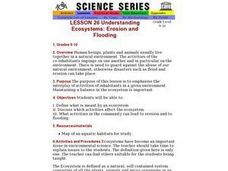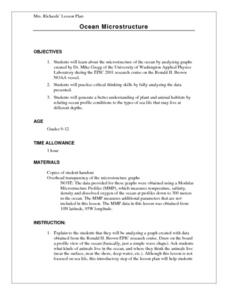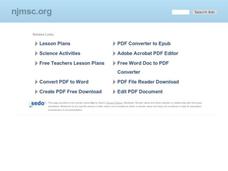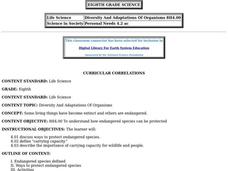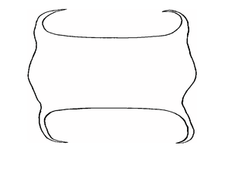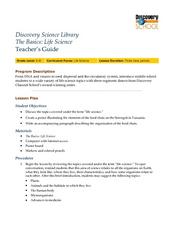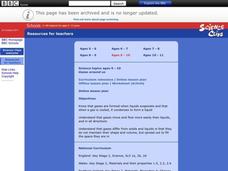Curated OER
Ocean Microstructure Lesson Plan
Pupils explore the microstructure of the ocean by analyzing graphs created by Dr. Mike Gregg of the University of Washington Applied Physics Laboratory during the EPIC 2001 research cruise on the Ronald H. Brown NOAA vessel.
Curated OER
Understanding Ecosystems: Erosion and Flooding
Students study the balance in the environment needed for ecosystems. They discuss what can lead to erosion and flooding.
Curated OER
March Market
Students role play a living wetland food web. They trace the food web associated with the items in their lunch.
Curated OER
Ocean Microstructure
Students assess the ocean's microstructure by analyzing graphs created during tne Ronald H.Brown research cruise. they discuss at what depths various sea animals live and write paragraphs on data analysis from the graphs.
Curated OER
Terrestrial Communities
Students watch a video about different terrestrial communities. They conduct an experiment with sponges conserving water. They research desert characteristics comparing them with other biomes.
Curated OER
Life on the Edge
Students participate in a variety of activities about endangered animals. They read books, watch videos, and, in pairs, choose an endangered animal to research. They create a 2 slide presentation to be compiled into a class slide show.
Curated OER
Diversity and Adaptations of Organisms
Eighth graders discuss ways in which to protect endangered species. They examine the concept of carrying capacity. They discuss the importance of carrying capacity for wildlife and people.
Curated OER
Understanding Estuaries
Young scholars work together to develop their own estuarine ecosystem in an aquarium. They observe the aquarium daily and record them in a notebook. They discuss the different interactions they see with the class.
Curated OER
Birds of Wisconsin
First graders explore the job done by ornithologists. They role play identifying the characteristics that make a bird a bird. They discuss what makes each bird species unique. Students are introduced to Wisconsin's most common and rare...
Curated OER
Penguin Parents are Cool
Fourth graders explore the lives of penguins and the relationship between them and their parents. They compare and contrast penguin populations in various areas of the world as well as their nesting sites. After constructing a penguin...
Curated OER
Skates
Students gain understanding of structure, characteristics, and basic needs of living things and their role in world, identify parts of skate, observe details of skate's body and skate egg case, and identify unique characteristics of skates.
Curated OER
Water Quality Monitoring
Students comprehend the four parameters of water quality. They perform tests for salinity, dissolved oxygen, pH and clarity or turbidity. Students comprehend why scientists and environmental managers monitor water uality and aquatic...
Curated OER
The Basics:Life Science
Middle schoolers explore concepts in life science using segments drawn from Discovery Channel. In this life science lesson, students participate in discussions about the food chain. Middle schoolers create a poster to illustrate a...
Curated OER
Meadow Study
Middle schoolers examine insects they collect in a sweep nets. They identify as many of the insects as they can.
Curated OER
Invasive Species
Young scholars use the Internet to research non-native plants that exist in their local community. Using this information, they analyze the invasive species effect on their environment. In groups, they plan and execute their own project...
Curated OER
Where Are the Dinosaurs?
Students explore what the dinosaurs were like. In this dinosaur lesson, the teacher peaks student curiosity about dinosaurs. This lesson would be a great starting point for a dinosaur unit since it primarily engages student interest and...
Curated OER
Sound and Hearing - Internet Research
Students use a website to help them recognize that sound is generated in a variety of ways and from different sources. They determine that sounds vary in tone and loudness, and learn there are different ways to describe sound.
Curated OER
Circuits and Conductors
Students participate in an online lesson to explain the conductivity of different materials and the effect of changing the power source.
Curated OER
Gases Around Us
Learners participate in an online lesson plan showing that gases are formed when liquids evaporate and that when a gas is cooled, it condenses to form a liquid, and gases move and flow more easily than liquids, and how gases differ from...
Curated OER
Changing State
Students participate in an online lesson to investigate the effects of cooling and heating on water.
Curated OER
Helping Plants Grow Well
Students explain the effect of water, temperature and light on plant growth.
Curated OER
Micro-organisms
Students examine how micro-organisms are living organisms that are often too small to be seen. They explain that micro-organisms may be beneficial or harmful.
Curated OER
Forces in Action
Students ask questions that can be investigated scientifically. They determine how to plan a fair test by changing one factor while keeping other factors the same, to use measurements to draw conclusions and use scientific knowledge to...
Other popular searches
- Zoo Animals Habitats
- Matching Habitats With Animals
- Swamp Animals Habitats
- Pet Animals Habitats
- Educational Animals Habitats
- Farm Animals Habitats
- Forest Animals Habitats
- Matching Animals and Habitats
- Habitats Animals Captions
- Water Animals Habitats
- Desert Animals Habitats
- Habitats Animals and Plants



